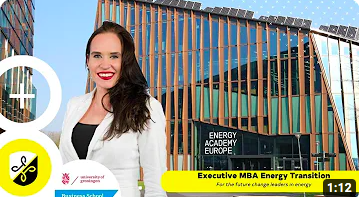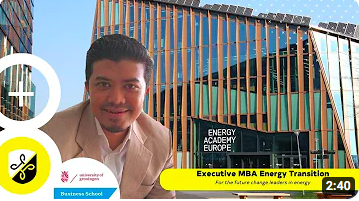Why others choose this Executive MBA
Other experiences
"Practical approach makes the learning experience extremely relevant and impactful"
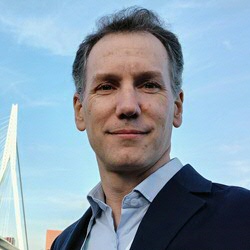
"I chose the EMBA in Energy Transition to gain a deep understanding of the dynamics reshaping the global energy landscape and to prepare myself to lead effectively in this new framework. The programme provided not only solid technical knowledge about energy transition but also valuable leadership training. I could immediately apply this to strategic projects within my company, from O&G exploration to green hydrogen developments at different scales. This practical approach made the learning experience extremely relevant and impactful for my professional role.
One of the most enriching aspects of the EMBA was the collaboration with peers from diverse companies and backgrounds. Working on team assignments and engaging in discussions during classes allowed me to learn as much from fellow students as from the lecturers themselves. These interactions broadened my perspective and helped me understand how different sectors are approaching the transition.
The quality of the faculty was exceptional; lecturers were highly experienced and well-prepared, bringing cutting-edge insights and real-world expertise to every session. Combined with the diversity of the cohort and the programme’s strong focus on practical application, this EMBA offers a unique opportunity for professionals navigating the challenges and opportunities of the energy transition. I strongly recommend it to anyone who wants to stay ahead and make a meaningful impact in this evolving sector".
Juan Tomasini, Head of Hydrogen at ANCAP, Uruguay - Alumnus 2025
"Excellent investment to stay ahead in a rapidly evolving industry"
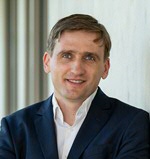
"I chose the EMBA in Energy Transition because I was already working in the oil and gas sector and felt a growing need to understand how the global shift towards sustainable energy would impact my industry. I wanted to be part of that transformation, and this programme seemed like the perfect opportunity to acquire the necessary skills and knowledge.
During the programme, I made already a significant career change, moving from oil and gas into a leadership role that directly focuses on the energy transition. This EMBA gave me the confidence to navigate this shift successfully, equipping me with the tools to make an immediate impact in my new position.
The programme provided deep insights into the energy transition, particularly in understanding how regulatory, technological, societal, and financial factors interact to drive the change. Lectures, case studies and hands-on projects equipped me with practical skills in analyzing external trends, developing strategies, and executing them effectively. Additionally, I enhanced my leadership abilities, not only through academic content and discussions, but also by working with professional coaches provided by the programme.
And finally, collaborating with fellow students, exchanging experiences and ideas, and building meaningful friendships were also some of the most rewarding aspects of this journey.
I would highly recommend this EMBA to anyone working in the energy sector or related fields. The program not only equips you with key insights about the future of energy, but also provides a solid foundation in leadership and strategic thinking. It’s an excellent investment for those looking to stay ahead in a rapidly evolving industry".
Marcin Glegola, Project Development Lead Decarbonization at RWE Generation - Alumnus 2024
"Great knowledge"
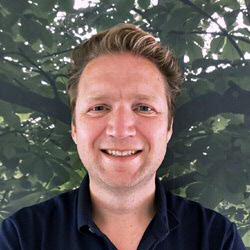
"Choosing the Executive MBA Energy Transition is choosing for great knowledge and insights into the energy transition in a fast pace. You learn what the boundaries and endless opportunities are and how to fulfil your own role in this field. It's an interesting journey with great professionals from the sector and other participants from around the world. Choose this great opportunity to unlock the potential of the transition for your organization, your own career and above all our planet!"
Paul van Velzen, Manager Sourcing, Pricing & Intelligence · ENGIE Energie Nederland NV - Alumnus 2023

"First of all, I wanted to continue my education and integrate my professional experience as an entrepreneur and manager with educational theory, as well as collaborate with other professionals. Secondly, I was looking for an educational institution with a recognized quality of educational services. The fact that the University of Groningen belongs to the top global universities convinced me to investigate the opportunity of pursuing an Executive MBA with this school. Finally, I believe that the specialisation of this programme (Energy Transition) is quite unique and much needed in current times. I am convinced that the set of information, skills, and abilities that I will gain, as well as the extension of my professional network, will be a valuable investment for my future career.
The two strongest points of this program are the high level of substantive knowledge conveyed and the excellent cooperation and atmosphere between students and lecturers. The selection of classes and lecturers is of a high standard and allows for obtaining knowledge at the highest global level. Although most lectures are held remotely, a warm yet substantive atmosphere has been created, which will stay with course participants for a long time.
When starting the course, I had no prior experience in the field of Energy Transition and myy knowledge was quite limited. Over the course of 2 years, I managed to grasp the basic concepts related to energy market functioning and gain knowledge about the expected directions of changes at the societal, legal, technical, and business levels. Currently, I am working on implementing the concept of microgrids into practical realities in my city. All of this is thanks to the knowledge I acquired during my studies.
Soft skills related to project management, people management, and career management are also important factors. I had the opportunity to confront my own experiences with academic theory and the experiences of other colleagues. In today's world, energy and climate issues are becoming increasingly important. It is difficult for me to imagine any field of activity that will not concern these areas.
The knowledge acquired during the course will provide participants with a solid substantive resource, which should be recognised by employers, business partners, and society at large. I wish I could do it one more time".
Bartlomiej Herodecki, Energy Consultant, Lodz, Poland - Alumnus 2023


